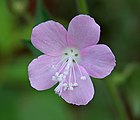Note: This is a project under development. The articles on this wiki are just being initiated and broadly incomplete. You can Help creating new pages.
Difference between revisions of "Pavonia zeylanica"
(→References) |
|||
| Line 73: | Line 73: | ||
<ref name="How to plant/cultivate">[http://tropical.theferns.info/viewtropical.php?id=Plumbago+zeylanica Cultivation Details]</ref> | <ref name="How to plant/cultivate">[http://tropical.theferns.info/viewtropical.php?id=Plumbago+zeylanica Cultivation Details]</ref> | ||
| + | <ref name="Uses">Karnataka Medicinal Plants Volume - 2 by Dr.M. R. Gurudeva, Page No. 291</ref> | ||
</references> | </references> | ||
| − | |||
| − | |||
| − | |||
==External Links== | ==External Links== | ||
Revision as of 18:11, 6 October 2021
Plumbago zeylanica, commonly known as Ceylon leadwort, doctorbush or wild leadwort, is a species of plumbago with a pantropical distribution. Carl Linnaeus described the paleotropical P. zeylanica and neotropical P. scandens as separate species, but they are currently considered synonymous.
Contents
- 1 Uses
- 2 Parts Used
- 3 Chemical Composition
- 4 Common names
- 5 Properties
- 6 Habit
- 7 Identification
- 8 List of Ayurvedic medicine in which the herb is used
- 9 Where to get the saplings
- 10 Mode of Propagation
- 11 How to plant/cultivate
- 12 Commonly seen growing in areas
- 13 Photo Gallery
- 14 References
- 15 External Links
Uses
Skin diseases, Menstrual disorders, Viral warts, Chronic diseases of nervous system[1]
Parts Used
Chemical Composition
Preliminary phytochemical analysis revealed the presence of sugars, steroids, flavonoids, alkaloids, quinones, phenols, tannins and terpenoids in its roots. [2]
Common names
| Language | Common name |
|---|---|
| Kannada | Sewanakudri, Antugogari, Shivana kadle |
| Hindi | |
| Malayalam | |
| Tamil | Mammatti |
| Telugu | Chinnamuttava |
| Marathi | NA |
| Gujarathi | NA |
| Punjabi | NA |
| Kashmiri | NA |
| Sanskrit | Balaa |
| English | Ceylon Swamp Mallow |
Properties
Reference: Dravya - Substance, Rasa - Taste, Guna - Qualities, Veerya - Potency, Vipaka - Post-digesion effect, Karma - Pharmacological activity, Prabhava - Therepeutics.
Dravya
Rasa
Guna
Veerya
Vipaka
Karma
Prabhava
Habit
Identification
Leaf
| Kind | Shape | Feature |
|---|---|---|
| Simple | Leaves are lance-shaped to ovate | Leaves are 1.5-3 cm long, 1-2.5 cm broad. Lower ones are usually 3-lobed - lobes oblong or obovate, entire or irregularly toothed, middle one longest. |
Flower
| Type | Size | Color and composition | Stamen | More information |
|---|---|---|---|---|
| Bisexual | Lance-shaped | Pink | Flower stalk is 2-4 cm long. Sepal-like bracts are 8-11, 1-1.3 cm long. Flowers are 1.5 cm long. Flowering from July to November |
Fruit
| Type | Size | Mass | Appearance | Seeds | More information |
|---|---|---|---|---|---|
| Simple Fruit | Spherical | 5 mm across | Velvety | Fruiting from March to May |
Other features
List of Ayurvedic medicine in which the herb is used
Where to get the saplings
Mode of Propagation
How to plant/cultivate
Prefers a position in full sun or partial shade, Slightly acidic soil. Plants can flower throughout the year. [4]
Commonly seen growing in areas
Photo Gallery
References
- ↑ Karnataka Medicinal Plants Volume - 2 by Dr.M. R. Gurudeva, Page No. 291
- ↑ Chemical composition
- ↑ Kappatagudda - A Repertoire of Medicianal Plants of Gadag by Yashpal Kshirasagar and Sonal Vrishni, Page No. 298
- ↑ Cultivation Details
External Links
- Ayurvedic Herbs known to be helpful to treat Skin diseases
- Ayurvedic Herbs known to be helpful to treat Menstrual disorders
- Ayurvedic Herbs known to be helpful to treat Viral warts
- Ayurvedic Herbs known to be helpful to treat Chronic diseases of nervous system
- Herbs with Flower used in medicine
- Herbs with Leaves used in medicine
- Herbs with Root used in medicine
- Herbs with common name in Kannada
- Herbs with common name in Tamil
- Herbs with common name in Telugu
- Herbs with common name in Sanskrit
- Herbs with common name in English
- Habit - Herbs
- Index of Plants which can be propagated by Seeds
- Herbs that are commonly seen in the region of Lowland forest
- Herbs
- Malvaceae



